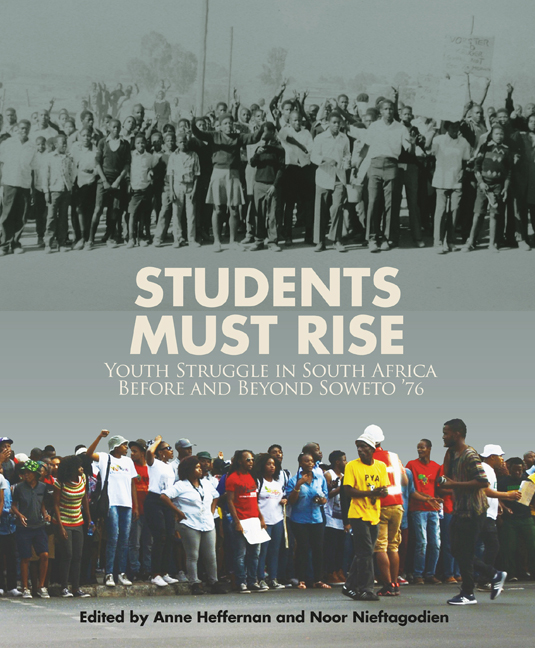Book contents
- Frontmatter
- Acknowledgements
- Contents
- Timeline
- Map Of South Africa
- Glossary
- Abbreviations
- Introduction: narratives of the student struggle
- Chapter 1 A brief history of the African Students’ Association
- Chapter 2 Youth and student culture: Riding resistance and imagining the future
- Chapter 3 The role of religion and theology in the organisation of student activists
- Chapter 4 Student organisation in Lehurutshe and the impact of Onkgopotse Abram Tiro
- Chapter 5 The University of the North: A regional and national centre of activism
- Chapter 6 Action and fire in Soweto, June 1976
- Chapter 7 What they shot in Alex
- Chapter 8 SASO and Black Consciousness, and the shift to congress politics
- Chapter 9 Youth politics and rural rebellion in Zebediela and other parts of the “homeland” of Lebowa, 1976–1977
- Chapter 10 My Journey, our journey: Activism at Ongoye University
- Chapter 11 ‘Let's begin to participate fully now in politics’: Student politics, Mhluzi township, 1970s
- Chapter 12 ‘They would remind you of 1960’: The emergence of radical student politics in the Vaal Triangle, 1972–1985
- Chapter 13 The ends of boycott
- Chapter 14 Fighting for ‘our little freedoms’: The evolution of student and youth politics in Phomolong township, Free State
- Chapter 15 ‘Every generation has its struggle’: A brief history of Equal Education, 2008–15
- Chapter 16 Contemporary student politics in South Africa: The rise of the black-led student movements of #RhodesMustFall and #FeesMustFall in 2015
- Selected Bibliography
Chapter 9 - Youth politics and rural rebellion in Zebediela and other parts of the “homeland” of Lebowa, 1976–1977
Published online by Cambridge University Press: 21 April 2018
- Frontmatter
- Acknowledgements
- Contents
- Timeline
- Map Of South Africa
- Glossary
- Abbreviations
- Introduction: narratives of the student struggle
- Chapter 1 A brief history of the African Students’ Association
- Chapter 2 Youth and student culture: Riding resistance and imagining the future
- Chapter 3 The role of religion and theology in the organisation of student activists
- Chapter 4 Student organisation in Lehurutshe and the impact of Onkgopotse Abram Tiro
- Chapter 5 The University of the North: A regional and national centre of activism
- Chapter 6 Action and fire in Soweto, June 1976
- Chapter 7 What they shot in Alex
- Chapter 8 SASO and Black Consciousness, and the shift to congress politics
- Chapter 9 Youth politics and rural rebellion in Zebediela and other parts of the “homeland” of Lebowa, 1976–1977
- Chapter 10 My Journey, our journey: Activism at Ongoye University
- Chapter 11 ‘Let's begin to participate fully now in politics’: Student politics, Mhluzi township, 1970s
- Chapter 12 ‘They would remind you of 1960’: The emergence of radical student politics in the Vaal Triangle, 1972–1985
- Chapter 13 The ends of boycott
- Chapter 14 Fighting for ‘our little freedoms’: The evolution of student and youth politics in Phomolong township, Free State
- Chapter 15 ‘Every generation has its struggle’: A brief history of Equal Education, 2008–15
- Chapter 16 Contemporary student politics in South Africa: The rise of the black-led student movements of #RhodesMustFall and #FeesMustFall in 2015
- Selected Bibliography
Summary
The massive eruption of the youth revolt in the township of Soweto near Johannesburg on 16 June 1976 sent shockwaves across the length and breadth of South Africa. Those tremors were felt in many other townships and rural villages almost instantly and in the years that followed until 1994. It was a major turning point as black youngsters took leadership at the forefront of popular resistance against the apartheid state. After 1976, schools, particularly in urban areas on the Witwatersrand, were turned into battlegrounds from which students repeatedly launched offensives against gutter education, authoritarianism and the apartheid system as a whole. While the shockwaves of the 1976 Soweto students’ uprising were felt in the countryside, it was only really in the period from the mid-1980s that the urban youth culture of resistance – what Colin Bundy (1987) labelled ‘generational consciousness’ – became widely entrenched among the rural youth as well. As a result of the social and historical processes that influenced them, rural youth became self-assertive and aware of themselves as a separate social category with a common identity, capable of changing the way their communities operated.
Many books and scholarly articles have been written about youth uprisings in the country but most of these tend to focus on Soweto and other townships on the Witwatersrand, where most of the popular resistance against apartheid was concentrated, with little consideration being given to the countryside. There are two main reasons why very little has been written about the unfolding of the Soweto Uprising in the South African countryside in general, and in the northern parts of the country in particular. The first reason has to do with researchers’ preoccupation with developments in towns, thanks to the relative ease of access to information and shortness of distance to research sites in urban areas. As a result, they have lacked meaningful contact with the countryside or knowledge of issues affecting rural communities. The second reason concerns the forms of struggles and resistance in the countryside that were invariably more low-key and incomplete and not as dramatic or as visible as those unfolding in the urban townships.
- Type
- Chapter
- Information
- Students Must RiseYouth struggle in South Africa before and beyond Soweto ’76, pp. 109 - 118Publisher: Wits University PressPrint publication year: 2016



